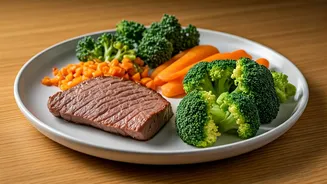Calorie Deficit Defined
Weight loss can often feel like a constant battle, marked by frustration. But, according to Dr. Siddhant Bhargava, a fat-loss doctor and nutritionist,
the path to successful and lasting weight loss centers on creating a calorie deficit. This means consistently consuming fewer calories than your body uses. The body then taps into stored fat for fuel, leading to gradual weight reduction. This fundamental principle underpins various diets, including keto and intermittent fasting.
How It Works
The science behind weight loss is fairly straightforward. When you eat fewer calories than your body requires daily, your body begins using stored fat for energy. Continuous energy is essential for bodily functions, so the body draws upon fat reserves when food intake falls short. This process of fat burning steadily reduces weight. It's worth noting that any weight loss plan, including approaches like the keto diet, intermittent fasting, and low-carb diets, relies on this core principle of a calorie deficit to achieve results.
Finding Your Method
There are different ways to achieve a calorie deficit. Some people find it simpler to eat smaller portions and choose foods that are lower in calories. Others may see better results by exercising more to increase their calorie burn. The key is to find a weight loss approach that suits your lifestyle and that you can maintain long-term. Consistency is crucial; it helps to reach your desired body weight goals.
No Magic Diet
Dr. Bhargava emphasizes that there's no single perfect diet. People often get caught up in celebrity-endorsed diets and the latest food trends before realizing these approaches don't work for them. He suggests developing a weight loss plan tailored to your personal habits, lifestyle, and body type. The right approach is about tracking your daily calorie consumption, and focusing on nutrient-rich foods that provide good nutrition while being low in calories.
Practical Tips
Implementing a calorie deficit effectively involves several practical steps. Start by recording your daily food consumption to understand your total calorie intake. Next, select foods that provide essential nutrients without excess calories, such as vegetables and lean proteins. Include physical exercises, like walking, jogging, or strength training, to increase your calorie burn. It is important to avoid fad diets that promise quick results but often fail in the long run. Consider consulting with dietitians or doctors to create personalized weight loss plans that best suit your individual needs and goals for sustainable results.














